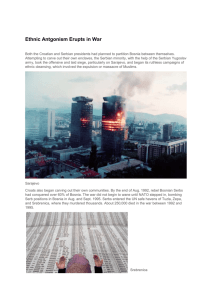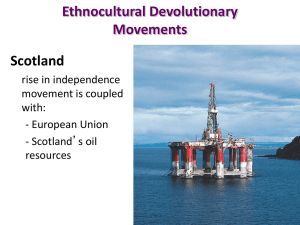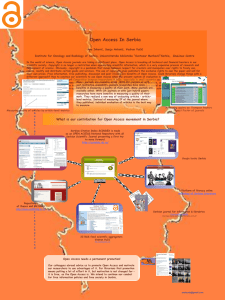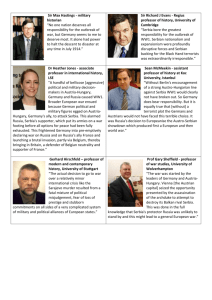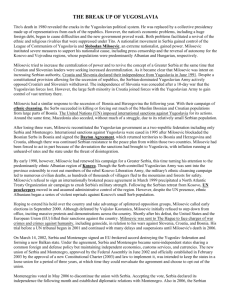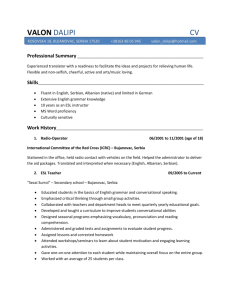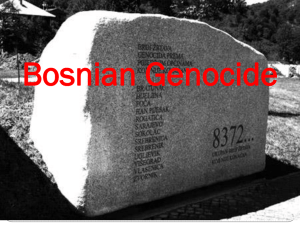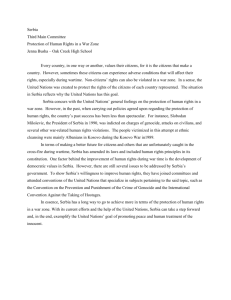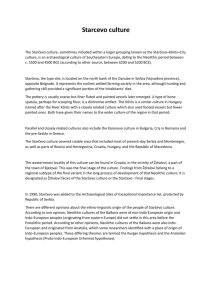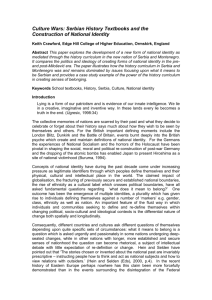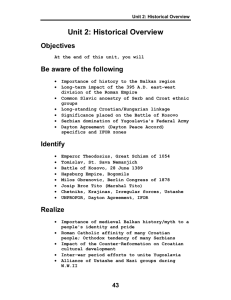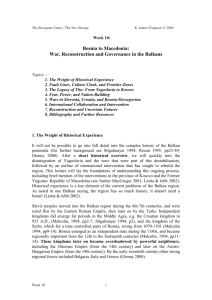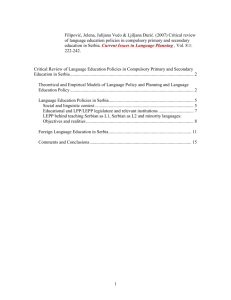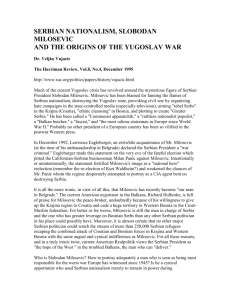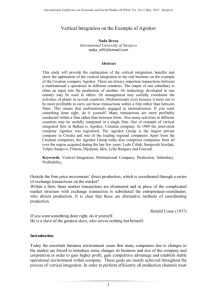Historic-Security-Council-Bosnian-War
advertisement
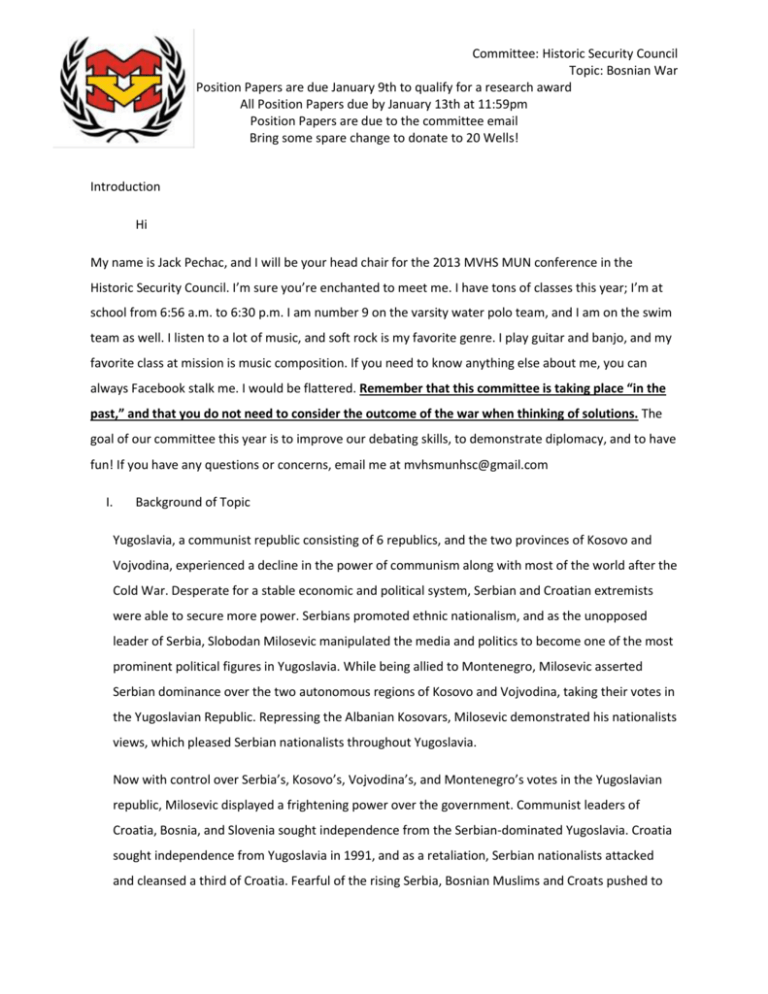
Committee: Committee: Historic Security Council Topic: Bosnian War Position Papers are due January 9th to qualify for a research award All Position Papers due by January 13th at 11:59pm Position Papers are due to the committee email Bring some spare change to donate to 20 Wells! Introduction Hi My name is Jack Pechac, and I will be your head chair for the 2013 MVHS MUN conference in the Historic Security Council. I’m sure you’re enchanted to meet me. I have tons of classes this year; I’m at school from 6:56 a.m. to 6:30 p.m. I am number 9 on the varsity water polo team, and I am on the swim team as well. I listen to a lot of music, and soft rock is my favorite genre. I play guitar and banjo, and my favorite class at mission is music composition. If you need to know anything else about me, you can always Facebook stalk me. I would be flattered. Remember that this committee is taking place “in the past,” and that you do not need to consider the outcome of the war when thinking of solutions. The goal of our committee this year is to improve our debating skills, to demonstrate diplomacy, and to have fun! If you have any questions or concerns, email me at mvhsmunhsc@gmail.com I. Background of Topic Yugoslavia, a communist republic consisting of 6 republics, and the two provinces of Kosovo and Vojvodina, experienced a decline in the power of communism along with most of the world after the Cold War. Desperate for a stable economic and political system, Serbian and Croatian extremists were able to secure more power. Serbians promoted ethnic nationalism, and as the unopposed leader of Serbia, Slobodan Milosevic manipulated the media and politics to become one of the most prominent political figures in Yugoslavia. While being allied to Montenegro, Milosevic asserted Serbian dominance over the two autonomous regions of Kosovo and Vojvodina, taking their votes in the Yugoslavian Republic. Repressing the Albanian Kosovars, Milosevic demonstrated his nationalists views, which pleased Serbian nationalists throughout Yugoslavia. Now with control over Serbia’s, Kosovo’s, Vojvodina’s, and Montenegro’s votes in the Yugoslavian republic, Milosevic displayed a frightening power over the government. Communist leaders of Croatia, Bosnia, and Slovenia sought independence from the Serbian-dominated Yugoslavia. Croatia sought independence from Yugoslavia in 1991, and as a retaliation, Serbian nationalists attacked and cleansed a third of Croatia. Fearful of the rising Serbia, Bosnian Muslims and Croats pushed to secede from Yugoslavia, but nationalist propaganda in Bosnia made Bosnian Serbs support ethnic cleansing. Expecting protection from the Yugoslav National Army (JNA), the rebelling republics were actually attacked by the Army, which had many Serbian nationalists as officers. Clearly in control of Milosevic, Croatia and Bosnia found themselves under attack from the 4th largest army in Europe. Sarajevo, a stronghold city for Muslims, Croats, and all those opposed to Serbia, was put under siege by Bosnian Serbs on April 6, 1992. The city has been continually under siege now for half a year, and inhabitants have been cut off completely. Action must be taken quickly, considering the danger that the city is under. II. United Nations Involvement With the onset of the war in Croatia, the United Nations Protection Forces (UNPROFOR) had been stationed in Sarajevo to contain the Croatian conflict. UNPROFOR failed in its mission to keep conflict from spreading into Bosnia, and when Sarajevo was placed under siege, UN forces were mostly evacuated. A few peacekeeping forces were left in Sarajevo as a deterrent to Serbian attacks. The UN has currently established an agreement with Serbian forces to allow UN flights into the Sarajevo airport, but this deal is highly restricted and regulated by Serbian Forces. This is an unreliable way to send aid to the city, and a more lenient deal must be made with Serbia, if peace cannot be achieved. III. Bloc Positions The middle-eastern bloc is opposed to the ethnic cleansing is Bosnia, due to their sympathy for those who share their religion. The western bloc is opposed to genocide of all forms. Most of the African bloc opposes this war for the same reasons as the middle-eastern bloc. The European bloc is ambivalent: some countries are opposed, while some nationalists glorify Serbia in their attempt to make a greater Serbia. The Asian bloc sides with most of the world in their opposition to Serbia’s actions. IV. Possible Solutions Serbia’s genocide in Croatia and Bosnia has been an attempt to control the seceding republics. The goal of this committee should aim to stop the violence. All issues must be addressed: freeing Sarajevo, reduction of violence, ending genocide, restoring deportees to their homes, and possible charges against Serbian nationalists for their actions must be answered. The UN has been successful in establishing a strict deal with Serbia, and Serbia’s small demonstration of diplomacy offers hope for a nonviolent solution. Economically and still politically unstable, Serbia is unpredictable in how it will react to the use of force. V. Guiding Questions 1. Sarajevo is the most pressing issue at the moment, and should be addressed as quickly as possible. What is a possible solution to evacuate Sarajevo, one that won’t agitate Serbia? 2. If war is stopped and Serbia draws back, what is to become of Croatia, Bosnia, and all other former republics of Yugoslavia? 3. How will Serbia be charged for their acts of genocide, ethnic cleansing, and mass rape in their war efforts? 4. How will nationalistic pride be dealt with so that more violence doesn’t break out? 5. Should Serbia’s force be limited so that they cannot further dominate surrounding countries of different ethnicities? VI. Works Cited http://www.balkandevelopment.org/edu_bos.html http://www.ppu.org.uk/genocide/g_bosnia.html http://www.thenagain.info/webchron/easteurope/SarajevoSiege.CP.html http://www.fsmitha.com/h2/ch35-3.htm
